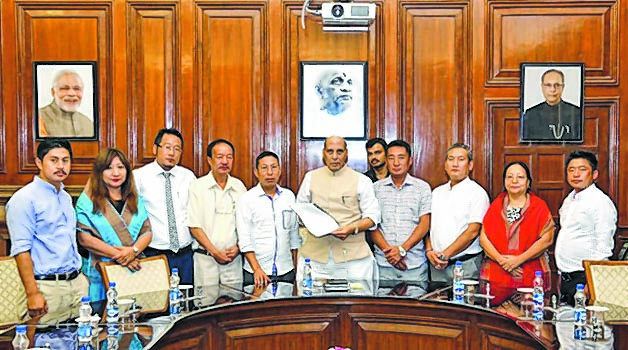 NEW DELHI, Sep 2: Apart from stating that the integration of all Naga inhabited areas under one administrative unit is a legitimate right of the Nagas, the Government of India has also agreed in principle that the Armed Forces Special Powers Act is not the best option to solve problems.
NEW DELHI, Sep 2: Apart from stating that the integration of all Naga inhabited areas under one administrative unit is a legitimate right of the Nagas, the Government of India has also agreed in principle that the Armed Forces Special Powers Act is not the best option to solve problems.
This was stated by Naga civil society organisations after meeting Union Home Minister Rajnath Singh at New Delhi yesterday.
Naga civil society organisations said that the Government of India has “agreed in principle that the Armed Forces Special Powers Act (AFSPA) has not been the best alternative in solving problems and that the Government of India will soon be holding its periodical review meeting, during which the demands of the Naga civil society organizations will be discussed for consideration”.
The Government of India has also “now agreed that the integration of Naga areas is a ‘legitimate right’ of the Nagas,” according to the Naga organisations camping in New Delhi presently.
In a joint statement made available to Newmai News Network this evening, the Naga civil society organizations comprising of the Naga Hoho (NH), the Naga Mothers’ Association (NMA), the Naga Students’ Federation (NSF) and the Naga Peoples’ Movement for Human Rights (NPMHR) said their camping in Delhi was in connection with the Wuzu firing incident of July 16, 2015 in which two school going children, a 13 year old girl Aso and a 14 year old boy Tuzali were killed and another young mother Esther was injured.
According to the Naga delegation, they sought justice in person from the Government of India and to ask for the withdrawal of the Disturbed Area Act (DAA) vis-a-vis the Armed Forces (Special Powers) Act.
“Side by side, the Naga civil society organizations also sought for early resolution of the Naga political problem,” the joint statement added.
“In this regard, the team met the Union Home Minister, Rajnath Singh, who was deputed by the Prime Minister of India, to meet the Naga civil society organization delegation on behalf of the Government of India on September 1, 2016. Prior to that, the delegation also met RN Ravi, the Interlocutor of the Government of India and the Minister of State for Home Affairs, Kiren Rijiju. In all these meetings, the delegation is glad to say that, all the above mentioned dignitaries have in principle agreed that AFSPA has not been the best alternative to solving problems and that the Government of India will soon be holding its periodical review meeting, during which the demands of the Naga civil society organizations will be discussed for consideration,” the joint press statement claimed. According to the Naga delegation, in so far as the Naga peace talks were concerned, for the Government of India, the Naga issue now stands as the “top priority” although India is faced with many other such problems, and that they are committed to settling the Naga problem at the earliest possible time. ” With the same concern, the Naga civil society organizations also called on NSCN-IM general secretary Th Muivah, who was accompanied by many of his senior colleagues, and apprised them of the discussion the delegation had with the Government of India and also sought some updates and status of the political negotiations.
“We are also glad to hear that the Government of India has now agreed that the integration of Naga areas is a ‘legitimate right’ of the Nagas,” the Naga delegation said.
“The only way for the Nagas to be able to determine for ourselves how to live our own way of life and also for the sake of future generations, and where draconian laws such as the AFSPA and others that are alien to our ways of life will become irrelevant, is to secure an acceptable and amicable political settlement with the Government of India,” the joint press communique of the Naga civil society organisations added.


